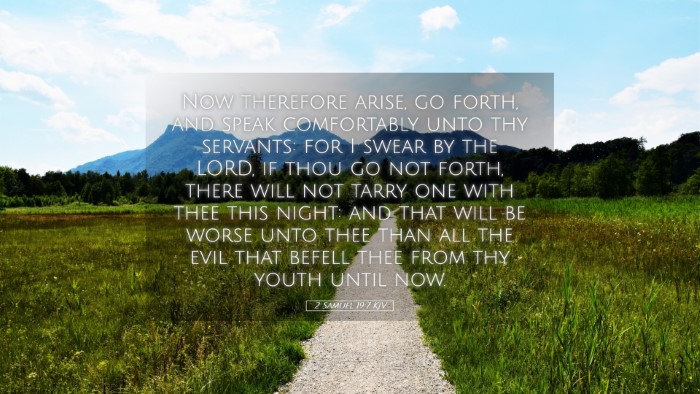Commentary on 2 Samuel 19:7
Verse Reference: 2 Samuel 19:7 - "Now therefore arise, go forth and speak comfort to thy servants; for I swear by the Lord, if thou go not forth, there will not tarry one with thee this night: and that will be worse unto thee than all the evil that befell thee from thy youth until now."
Contextual Overview
This verse occurs in a pivotal moment following the rebellion of Absalom, where David's kingship is threatened. David had mourned this loss deeply, and now as he returns to the throne, it is essential for him to reconnect with his followers.
Insights from Commentaries
Matthew Henry's Commentary
Matthew Henry emphasizes the importance of communication and reconciliation in leadership. He notes that David, though a king, was aware that his emotional state could hinder his ability to govern effectively. The call to "speak comfort" reflects a king's duty not only to maintain authority but to nurture the spirits of his followers. Henry rightly observes that David’s reign required not only military prowess but emotional intelligence.
Albert Barnes' Notes on the Bible
Albert Barnes highlights the urgency in Joab's message to David. Joab recognizes that the people's loyalty is waning, and if David doesn't restore their morale, he risks losing them altogether. Barnes points out that the phrase "worse unto thee than all the evil" signifies a profound understanding of leadership dynamics; a leader who isolates himself or neglects his people's morale faces far graver consequences than the trials they previously endured. This message is critical for pastors and church leaders, who must nurture their congregations alongside their spiritual responsibilities.
Adam Clarke's Commentary
Adam Clarke adds another dimension by discussing the psychological impact of leadership. He notes that David’s emotional turmoil after Absalom’s death could lead to a downward spiral in his governance if not addressed properly. Clarke explains that effective leaders must be aware of their emotional states, as they have a cascading effect on the community. Clarke posits that Joab's admonition was not merely tactical but fundamentally relational; David needed to engage with his followers to restore trust and confidence.
Applications for Pastoral Leadership
- Emotional Intelligence: Pastors must recognize the importance of their emotional well-being in ministry. Acknowledge that one's struggles can impact the entire community.
- Communication is Key: Like David, who was encouraged to comfort his people, leaders should actively communicate with their congregations, seeking to comfort and guide them through challenging times.
- Reconciliation: This passage reminds leaders of the need for reconciliation and restoration after periods of conflict. Whether facing internal strife or external pressures, leaders should prioritize mending relationships.
Theological Reflections
This passage raises many theological questions about the nature of divine leadership. It poses essential reflections on how God desires leaders to act. The call to 'speak comfort' acts as a reminder that God's heart is towards healing and restoration.
God's Sovereignty and Human Responsibility
The balance between divine sovereignty and human responsibility is evident. David’s role is to lead and comfort while acknowledging that God ultimately directs human affairs. Leaders are charged with the responsibility to act in faith and obedience, trusting that God will guide their actions and decisions.
The Role of Grief in Leadership
David’s grief over Absalom highlights how leaders are human and experience profound emotions. This honesty about grief is significant in pastoral care. Embracing grief while fulfilling leadership duties is a nuanced balance that leaders must navigate.
Conclusion
In 2 Samuel 19:7, we find a critical moment that serves as an enduring lesson for today’s leaders. The combined insights from Matthew Henry, Albert Barnes, and Adam Clarke illuminate the significance of emotional health, the necessity of communication, and the relational dynamics of leadership. Pastors, theologians, and scholars can draw from these insights to foster environments of healing, growth, and reconciliation within their communities. The message extends beyond ecclesiastical settings; it is a model for leadership across various spheres of influence.


